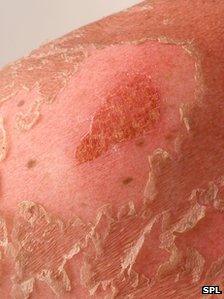Skin cancer rise 'due to explosion in holidays and sunbeds in 1970s'
- Published

Scottish skin is not designed for sunshine, Professor Rees said
The explosion in cheap package holidays and sunbeds in the 1970s may explain the rise in skin cancer in the over 50s, Cancer Research has said.
The figures from the charity show that diagnosis among middle aged men and women had trebled within 30 years.
There are 29 cases of malignant melanoma in every 100,000 of the Scots population aged 50-59, compared with nine per 100,000 in the late 1970s.
Four people in their 50s are diagnosed with the disease in Scotland each week.
The charity, which said people had a better chance of beating the disease if it is caught early, has launched a campaign in partnership with a supermarket chain to raise awareness about the early signs of cancer.
Cancer Research UK leaflets with advice on preventing skin cancer will be available to customers in Tesco pharmacies and cafes.
The firm is also aiming to raise £10m to fund 32 Cancer Research UK early diagnosis projects around the UK.
'Bird-spotting'
One of the projects benefiting is being carried out by a group of researchers at the University of Edinburgh.
The team, led by Professor Jonathan Rees, is examining how the internet could be used to access images of skin cancer and ways to help people recognise the signs earlier.
Professor Rees told the BBC: "You only have one skin for your whole life. If any damage occurs, it accumulates. Tumours reflect the history of damage to your skin, throughout your life.
"People's idea of what skin cancer looks like is limited to three or four images that are widely used to promote awareness of the disease - but we don't think this goes far enough with helping people identify the problem and going to their doctor.
"It's a bit like bird-spotting - using pictures as a guide to what malignant melanoma could look like and helping people make a better decision about seeing their doctor.
"Scottish skin isn't designed for sunshine and it's worrying that melanoma rates are on the rise.
"But, if caught early, melanoma can be treated very successfully so if we can develop a better system of encouraging people to go to the doctor, this could potentially save a great deal of lives."
- Published25 May 2011
- Published6 April 2011